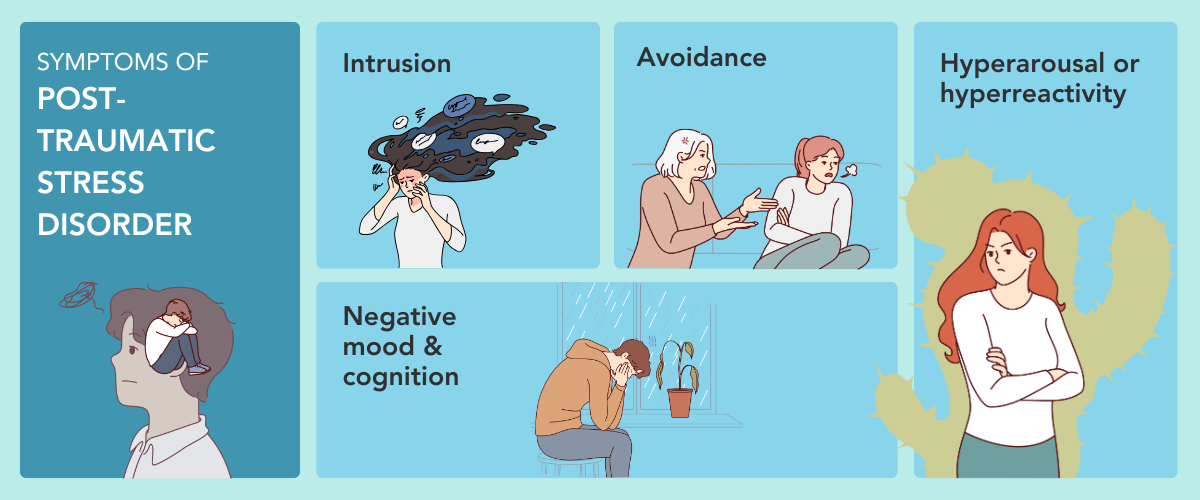Psychological trauma is a strong emotional reaction to a very distressing event. It can range from a single incident to chronic situations where the events happened repeatedly over time. It usually involves abuse or loss and might come in the form of assault, injuries, accident, war or natural disasters.
Trauma affects different individuals differently. While some recover over time with support, others may continue to struggle with symptoms long after the event.

Common early reactions after a traumatic event may be:
- Physiological: Fatigue, frequent headaches or dizziness, aches and pains
- Emotional: Irritability, angry outbursts, feeling anxious and helpless, moody, frustration
- Cognitive: Decreased concentration, confusion, mental block, negative thinking, forgetfulness
- Behavioural: Appetite changes, poor sleep, isolating self, increased use of alcohol
In some cases, trauma can be passed down from one generation to another. Inter-generational trauma happens when a person's parenting and world view is affected by past trauma, thus impacting future generations.
Trauma is not the same as post-traumatic stress disorder (PTSD). While trauma is the emotional response to a traumatic experience, PTSD is a specific mental health condition that may develop if trauma continues to affect our daily lives.
It is normal to have physiological, emotional, cognitive and behavioural reactions after a traumatic event. Ms Tracy Wee, principal medical social worker and family therapist advises that these feelings usually subside over time.
However, some individuals may continue to experience these symptoms persistently for months or even years. PTSD is one such mental health condition that can occur in the aftermath.
About 5.6 percent of people who face a traumatic event will develop PTSD, according to the World Health Organisation.
 Symptoms of PTSD include:
Symptoms of PTSD include:
- Intrusion: Recurrent recollections of the traumatic event, which might occur through intrusive memories, nightmares, or even flashbacks. Some might have intense distress or strong physiological reactions to reminders of the traumatic event.
- Avoidance: Deliberately avoiding situations, activities, people, thoughts, feelings or memories related to the traumatic event. Some may even avoid seeking help or talking about the event.
- Negative mood and cognition: Strong negative emotions including fear, guilt, shame, horror and anger. Others might feel more detached and numb with a loss of motivation in engaging in activities. Some have difficulties recalling the traumatic event. Some have strong negative beliefs about themselves, others, and the world.
- Hyperarousal or hyperreactivity: This can appear as being easily startled, jumpy, having poor concentration, or poor sleep. It may also show up as anxiety or being quick to anger. Some people appear more alert to danger than usual or might engage in risky behaviours.
When left unaddressed, persistent symptoms can disrupt a person's work, school, relationships as well as health and well-being. Without help, symptoms can get worse over time. They may also lead to other mental health problems, like depression, anxiety, or substance abuse.
The effects of untreated mental health conditions can extend beyond the individual, impacting families and even future generations. Traumatic events in childhood can interfere with brain development and learning, behaviour and emotional response later in life.
Researchers have also linked PTSD to a higher risk of physical health issues, such as high blood pressure, chronic pain and heart disease. A study on World War II and Korean War veterans found that those with PTSD symptoms had a higher risk of artery, skin, muscle and digestive issues.
Early support can prevent long-term consequences and help individuals heal.
PTSD is treated using a combination of psychotherapy and medication. Depending on the symptoms, a doctor may prescribe medications such as antidepressants or anti-anxiety medications for mood and anxiety symptoms, and prazosin for nightmares. Psychotherapy can help reduce unwanted thoughts, hypervigilance and avoidance. This can allow for better quality of life.
In some cases, psychotherapy for PTSD includes Cognitive Behavioural Therapy (CBT) and Eye Movement Desensitisation and Reprocessing (EMDR).
In CBT, individuals learn techniques and skills to reframe their beliefs and manage their strong emotions regarding the traumatic event. Sometimes, individuals are also asked to engage in certain exposure tasks to face their fears.
In EMDR, external stimulus, such as therapist-directed eye movements or sounds, are used to help individuals process traumatic memories. It aims to lessen the emotional distress linked to those memories and install new positive beliefs about the event.
Importantly, CBT and EMDR, or any other psychotherapy techniques, should only be conducted by trained professionals.
Moving on after a stressful event can be challenging. One of the most important first steps is acknowledging and managing emotional reactions instead of downplaying them.
Ms Wee shares proactive steps to support yourself or someone who has experienced traumatic events:
- Face your feelings head-on: Avoid supressing or minimising feelings. Provide space to feel what you're feeling without judgement.
- Stay connected: Share your experiences and feelings with trusted people instead of isolating yourself. Talk to family, friends or colleagues who will listen and understand.
- Be kind to yourself: Spend time on healthy and calming activities. Try exercising, eating well, meditating or enjoying hobbies. Recovery takes time, so don't push yourself to bounce back fast.
- Keep familiar routines: Get back to your normal daily schedule as soon as you can. This helps to restore a sense of normalcy and control.
- Pace yourself: Major changes or decisions can wait. Slow down and focus instead on personal goals and strengthening healthy bonds with family, friends and the community.
- Know when to seek professional help: The stress that comes with a traumatic event can be crippling. If feelings or symptoms interfere with daily functioning, reach out for help.